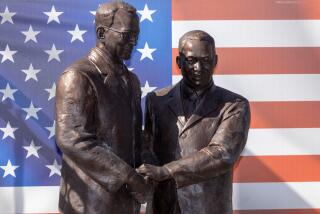PERSPECTIVES ON MARTIN LUTHER KING : Was the Dream Message About Color or Character? : Affirmative action is the latest issue to claim his words. But he spoke for his time, when ambiguity was key to selling the cause.
Every year, it seems, the commemoration of the Rev. Martin Luther King Jr.’s birthday brings a new skirmish between different interpreters of his legacy. This year, the issue is affirmative action, with both supporters and opponents claiming that if King were alive, he’d be on their side.
Opponents of affirmative action repeatedly cite the line in his famed “I Have A Dream” speech at the March on Washington in August 1963, in which he called on Americans to judge individuals on the content of their character and not the color of their skin. Supporters of affirmative action say that this deliberately distorts the spirit and intent of King’s words. They both are right.
There is enough paradox and ambivalence in the few stray remarks that King uttered on the issue to give ideological ammunition to both camps. But this should not surprise. King was not an orthodox ideologue. He railed against and embraced black militants. He advocated conservative self-help programs and socialist wealth redistribution. He applauded violent anticolonial and national liberation movements and championed nonviolent change.
The March on Washington speech was a masterpiece of King’s curious blend of morality, pragmatism and ambivalence. At the time, affirmative action had not seeped into the nation’s vocabulary and quotas and goals were not issues of public debate. King was not referring to discrimination in employment or government contracting. He referred to his four children. He was worried that they would be denied equal opportunity because of legal segregation. This was not a visionary declaration but a simple expression of parental concern.
In dozens of speeches and articles during the next two years, King did not demand that the government and corporations create special programs or incentives exclusively for blacks. With the passage of the Civil Rights Act in 1964, he realized that integrating a motel or lunch counter did not provide jobs, decent housing and better schools for the black poor. These were stubborn and intractable problems that required massive spending on new social programs by the government and businesses.
The urban riots and the growing white backlash further heightened King’s sense of urgency that something had to be done to stem the violence. But King remained ambivalent over how to tackle the problems of the urban poor. In an interview with Playboy magazine in January 1965, he was asked if he thought it was fair for the government to spend billions on special programs for blacks for the centuries of uncompensated toil during slavery. He cited the Marshall Plan, aid to Appalachia and the GI Bill of Rights as examples of the federal government bankrolling programs to aid specific constituencies. But he did not demand special economic programs exclusively for blacks; he called for policies that would improve the lot of the “disadvantaged of all races.” When the interviewer pressed King on specifics, he was vague, mentioning the need for the government and corporations to increase spending for jobs, skills, training, education and public works.
King sensed that the issue of jobs could inflame blacks and whites. He said that black and white workers suffered equally when jobs were lost and tactfully called on organized labor to fight for more “jobs for all.”
Later in the interview, King was asked whether he advocated special government preferences for blacks to end housing discrimination. King continued to walk the political tightrope and mildly advocated more “government aid to improve housing for Negroes.” Mindful of the fears and hostility of many whites toward housing integration, King assured them that if housing discrimination were eliminated, blacks would not rush pell-mell into white neighborhoods, but “would choose to live among themselves exactly as Poles and Jews and other ethnic groups do.” The promise of black self-segregation coming from America’s foremost advocate of integration seemed strange and contradictory.
Lyndon Johnson took the cue and displayed the same caution and ambivalence when he signed a 1965 executive order banning discrimination by federal contractors. Johnson called on employers to take “affirmative action” to ensure that job applicants are hired and employees promoted without regard to race. The order mandated that federal contractors set time-tables for expanding the pool of women and minority hires. Although it did not impose quotas or specific goals for hiring, Johnson was trapped in the same paradox as King. Everyone understood that “affirmative action” was designed to encourage employers not just to hire and promote the “disadvantaged” of all races, as King insisted, but to advance blacks in the work force. But if blacks were favored, Johnson and King knew, many whites would be left out in the economic cold. This well-intentioned but ambiguous act of social engineering sowed the seed of future public misunderstanding and created a huge opening that politicians have used to exploit affirmative action as a wedge issue to get votes on the cheap.
The Playboy interview was the first and last time that King dealt frontally with affirmative action. We mustn’t blame him if he muddled the issue. After all, there was no ambivalence in his pursuit of justice and equality. Even when some use his words against him, that is still the most important thing to remember about his life.
More to Read
Sign up for Essential California
The most important California stories and recommendations in your inbox every morning.
You may occasionally receive promotional content from the Los Angeles Times.










